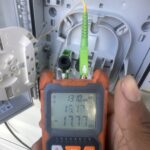Heart disease remains the leading cause of mortality worldwide, accounting for nearly 18 million deaths annually. While advancements in medicine have improved treatments, early diagnosis remains a critical challenge-especially in digitally underserved regions. In this context, a new study led by Dr. Mohan Raja Pulicharla offers a significant leap forward in utilizing artificial intelligence to bridge that gap.
Titled “A Study on a Machine Learning Based Classification Approach in Identifying Heart Disease Within E-Healthcare,” the research presents an intelligent diagnostic system designed to assist healthcare providers in early-stage heart disease prediction using data-driven models. The work demonstrates how machine learning (ML) can be seamlessly integrated into e-healthcare platforms to improve diagnostic accuracy, accelerate screening, and reduce the burden on clinical resources.
The Problem at Hand: Data-Rich but Diagnosis-Poor
Healthcare systems today are generating enormous amounts of patient data-ranging from clinical notes and lab results to wearable sensor readings. However, much of this data remains underutilized, especially when it comes to drawing predictive insights. Traditional rule-based diagnostics struggle with scalability and often lack adaptability to diverse patient populations.
In his research, Dr. Pulicharla focuses on creating a classification-based ML framework that transforms structured patient data into meaningful predictions about cardiovascular risk. His aim: to empower digital health solutions with the capability to make proactive, intelligent assessments-a vital function in preventive cardiology.
Dr. Pulicharla’s Methodology and Key Contributions
At the heart of the study is the implementation and evaluation of several ML classification algorithms, trained to detect patterns associated with heart disease from a clinical dataset. The research involved:
Data Preprocessing and Feature Selection
Using a curated dataset of anonymized patient records, the study applied normalization, outlier removal, and correlation-based feature selection to extract key attributes such as age, cholesterol levels, resting ECG results, and maximum heart rate.
Model Implementation and Comparison
Multiple classification algorithms were tested, including:
- Logistic Regression
- Decision Trees
- Support Vector Machines (SVM)
- Random Forests
- K-Nearest Neighbors (KNN)
Each model was rigorously evaluated on metrics like accuracy, precision, recall, and F1 score. The Random Forest model emerged as the most reliable classifier, achieving an accuracy rate exceeding 87% and showing robustness across different patient demographics.
Real-Time Application in E-Healthcare Environments
Beyond model training, the research outlines a deployment blueprint where the trained model can be embedded within cloud-based EHR systems or telemedicine apps, allowing for real-time diagnostics even in remote clinical settings. This integration is critical for scaling AI tools in low-resource environments.
Why This Research Matters
The implications of this study are both clinical and technological:
- Clinicians gain a second-opinion tool that supports decision-making, particularly in ambiguous or borderline cases
- Patients benefit from faster diagnosis and earlier intervention, potentially reducing the risk of severe cardiac events
- Healthcare systems benefit from automation that saves time, cuts costs, and improves patient triage
In particular, the study emphasizes the potential of ML to standardize diagnostics and eliminate human bias-making it especially useful in large-scale health screening programs and e-health apps used by primary care providers.
“Our goal is not to replace physicians but to equip them with tools that enhance accuracy and efficiency,” says Dr. Pulicharla in the study. “By leveraging data and algorithms, we can make heart disease detection more accessible, especially in regions lacking expert specialists.”
The Path Ahead
The study concludes with several future directions, including:
- Integration with wearable health data for continuous cardiac monitoring
- Expansion to multi-disease detection frameworks for conditions like diabetes and hypertension
- Federated learning strategies to enable model training on decentralized patient data while preserving privacy
By anchoring machine learning solutions within real-world e-healthcare workflows, this research offers a clear path to intelligent, scalable, and human-centered digital health systems.
“A Study on a Machine Learning Based Classification Approach in Identifying Heart Disease Within E-Healthcare” is a timely and impactful contribution to the intersection of medical science and artificial intelligence. Through thoughtful methodology and technical rigor, Dr. Mohan Raja Pulicharla has demonstrated how machine learning can be practically deployed to transform diagnostics and save lives.
As the healthcare industry continues to embrace digital transformation, research like this provides the framework and confidence needed to implement AI safely, ethically, and effectively. Dr. Pulicharla’s study underscores a powerful truth: when data and compassion come together through innovation, the future of medicine becomes not only smarter-but also more humane.





